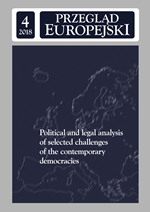New generation trade agreements as an economic challenge for the European Union and its Member States – the case of CETA
New generation trade agreements as an economic challenge for the European Union and its Member States – the case of CETA
Author(s): Magdalena ŚliwińskaSubject(s): Politics / Political Sciences, Economy, Law, Constitution, Jurisprudence, Political Sciences
Published by: Wydawnictwa Uniwersytetu Warszawskiego
Keywords: new-generation trade agreements; CETA; economic integration; EU; European integration; umowy handlowe nowej generacji; integracja gospodarcza; UE; integracja europejska
Summary/Abstract: The so-called new-generation trade agreements, such as the CETA agreement signed by the EU and Canada,include not only the liberalization of trade in goods and the creation of a free trade area, but also manyother areas, such as liberalization of the services market, including public services, mutual recognition ofprofessional qualifications, deregulation and liberalization of financial markets, enhanced cooperation in theprotection of intellectual property, and mutual investment protection. The considerations carried out in thiswork show that the analysis of the consequences of this type of agreements should be carried out not only atthe level of the entire EU but also from the perspective of individual member states whose level of economicdevelopment and economic structures differ significantly. This is important for proper preparation for theentry into force of such an agreement, creating conditions for the full use of the opportunities arising from itand for adapting to the new market-specific situation and avoiding the greatest possible threats.
Journal: Przegląd Europejski
- Issue Year: 2018
- Issue No: 4
- Page Range: 141-158
- Page Count: 18
- Language: English

